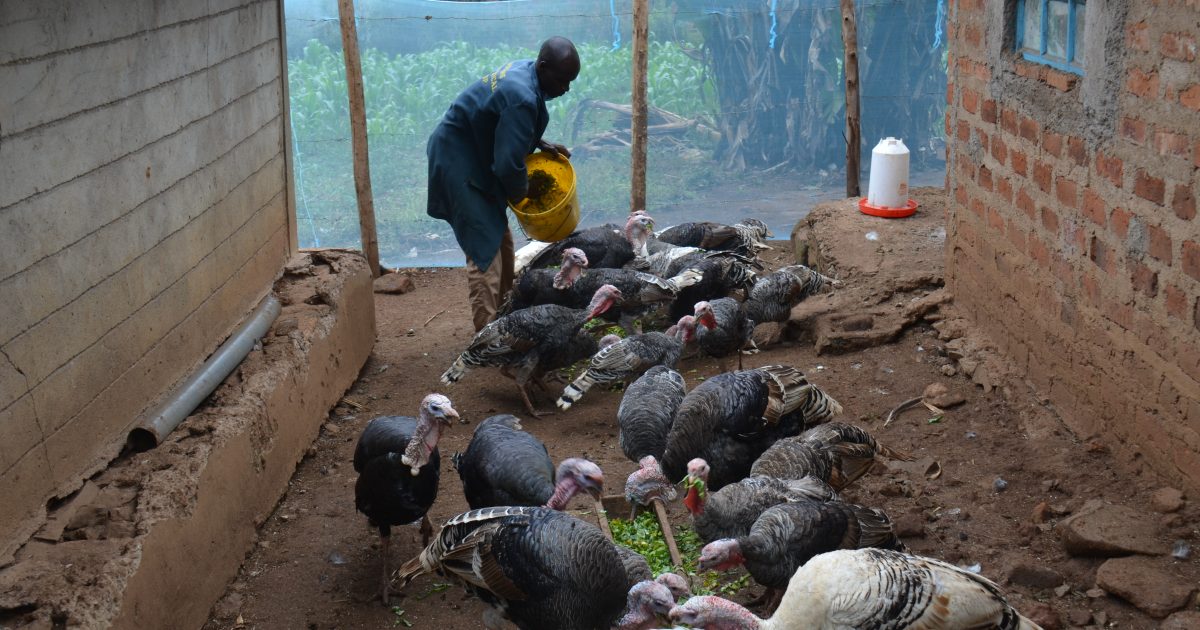The ear-piercing plain yelp, purr, cluck, cut and kee-kee noises from excited Turkey birds welcome one to Mr. Benard Osunga’s vast turkey farm in Kakrao village, Suna East Sub County of Migori County.
Osunga has been a turkey farmer for two years now and currently owns 207 standard bronze and black turkeys on his one-acre farm.
He jumped into rearing the beautiful and good income earner birds in 2021 after the in-famous Covid-19 pandemic rendered him jobless and begging for survival.
Poultry farming in Kenya, Turkey rearing inclusive, is one of the biggest income earners for more than 80 percent of rural households contributing to 1.7 percent of the total Gross Domestic Product (GDP) as per the statistics of 2019 Kenya National Bureau of Statistics (KNBS).
In recent years, Turkey farming has become one of the profitable poultry ventures that the majority of bird farmers have turned into.
In 2015, the quail agribusiness enthusiasm took over the country as a storm, where a majority of Kenyans reaped from the golden opportunity.
But for Osunga, the 30 years old father of one, he started with only four birds that have so far seen him sell more than 73 turkeys generating an income of Sh800,000 in that short span of time.
Osunga’s life story started in Nairobi where he used to do menial jobs at one of the construction sites. The outbreak of Coronavirus rendered him jobless in the construction work that he solely depended on to provide for his small family.
After hard economic times in the city, he came home with the little he had after purchasing four turkey birds and the rest he says is history.
Osunga says that he is able to make between shs12, 000 to 16,000 by selling one turkey. He underscores that turkeys are sold in terms of weight where a kilo can cost you more Sh800.
“Cash generated from one turkey is an equivalent of 10 chicken, while a turkey egg equates to the cash from a tray of chicken eggs,” Osunga notes.
Although turkey agribusiness is quite expensive to start Osunga says that the returns are quite encouraging as compared to other poultry farming.
He notes that the cheapest pair of four months old Turkey birds cost Sh10,000, which makes it a difficult venture for the majority of youths.
Alternatively, he says that youths can purchase eggs at 350 for hatching and collect the two-month-old chicks at a lower cost.
He discloses that in a bad month he can make at least Sh40, 000 from the sale of his turkey birds and eggs.
The farmer has also planted maize on his one-acre farm as feed for his turkey birds.
He affirms that the maize grains are then made into homemade poultry feeds which lowers his production costs.
In terms of markets, Osunga says that he has three categories of customers. The one that want turkey for home beautification and security, meat and eggs consumption and those for business.
Besides sale for food and beautification, the birds are advantageous to home owners for security as they alert families when there is any perceived threat on them.
The birds produce high-pitched trill indicating they are becoming aggressive when they perceive danger lurking within the home by spotting a stranger or snake or any other straying animal.
Osunga notes that the venture of keeping these birds is profitable, unlike the common chicken which is only sold for meat and eggs.
In comparison to other birds, turkeys grow faster, are more adaptable to feeding and have a higher dressed weight compared to chickens.
“My biggest market is Migori, Siaya and Kisii Counties, especially learning institutions and big hotels. I have also been selling to customers across the country who request the same on my Facebook Page.
Osunga also adds that he does training upon request at a fee to train those that wish to venture into the business.
He claims that Kisumu, Busia and Nandi counties are some of the regions that have been frequently using his training sessions to learn about agribusiness.
His advice to fellow youths is to venture into something that they have an interest in and which they best understand.
By Geoffrey Makokha and George Agimba





